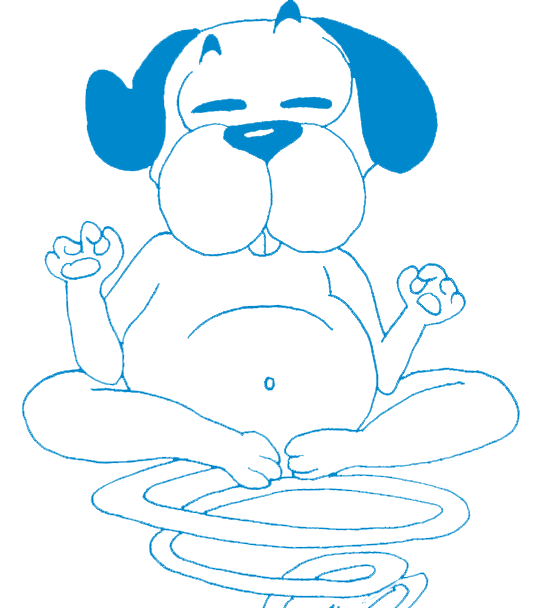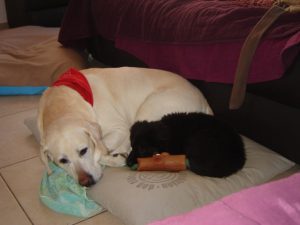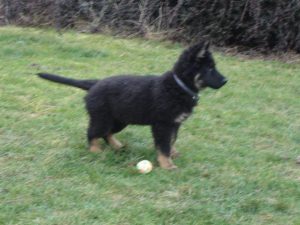The puppies begin to be active in the litter, with their mother and siblings. Born blind and deaf, the puppies are already able from birth to taste, smell and feel. The breeder (be it a professional breeder or the person in whose home the litter was born) may have a few cuddly toys of different materials at their disposal. The puppies’ 3 senses are then solicited.
Sight and hearing are acquired between the 11th and 13th day. Two days after the development of sight and hearing, the breeder may place an object near the puppies. They begin to discover the world little by little (only one novelty at a time: a human, a tube, a cardboard box, a bag, a toy, a cushion, a sound,…). Too much could stress the litter: too many noises, people, objects, handlings,…
Between 2 and 2 1/2 weeks of age, puppies may crawl and look outside their burrow for a few moments before their mother brings them in.
From 3 or 4 weeks onwards, they can be left to explore gradually and gently. They discover a new world full of stimuli. Just let the puppies make choices, without forcing or coercing them. They gradually gain independence and learn to be curious.
Learning is more effective if our dogs (like humans for that matter) learn on their own. Of course, we must take care of the litter, to ensure the safety of each member, but it is important to let the puppies discover and test their environment.
The ideal age to leave the litter is between 9 and 12 weeks of age. It is up to the new adopter to take over. In order for our new arrival to feel safe and secure, he will need:
|
|
|
Let’s think about preparing the house for his arrival: the different places to eat, drink, relieve himself and sleep. When the puppy has arrived at our home, let him have time to acclimatise: everything he knew before has disappeared and he finds himself in a new world. Let him have two or three days to get to know his new home and his new playmates (humans, dogs or others).
After acclimatisation to his new environment, we can offer him to start activities, always respecting his development and his experience of the world. A dog born in the country is not used to the sounds and smells of the city. A dog born in the city does not know the sounds of farm animals and has probably never seen or heard tractors.
The chronology above is that of a puppy but our new companion could be an adult. If adopting a teenage or adult dog, it is also important to prepare the house for his arrival and let him acclimatize before starting activities. Depending on our dog’s natural predispositions (“I’m not afraid of anything – I’ll go for anything”, “I’m not comfortable with my new life”, “I like my new friends”, “I’m terrified of this new environment”,…), we will take care to put him at ease with his new life, if necessary, and in any case to adapt the activities to his knowledge of the world and his physical and mental abilities.
[1] For quality sleep, the puppy needs to feel secure. This means that he should not be left alone: if a human or another dog is present, the puppy knows that this companion will stand guard and that he is safe.
[2] The dog is a social animal, which naturally needs contact and companionship. If our way of life requires us to leave our dog at home, it is essential to teach him to stay alone or to find him a companion or dog-sitter.
TAKEAWAY
- Discovering the world begins with mom and siblings;
- Just let the dogs make choices, without forcing or constraining;
- Let us ensure the feeling of security of our new arrival (eating, drinking, sleeping, peeing and pooing, social contacts);
- Respecting the development and his experience of the world (dogs in cities > < dogs in countryside).



